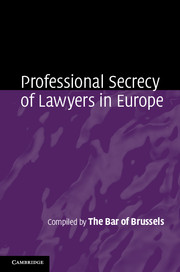Book contents
- Frontmatter
- Contents
- Contributors
- Preface
- 1 Professional secrecy in Europe
- 2 The CCBE rules on professional secrecy
- 3 Austria
- 4 Belgium
- 5 Bulgaria
- 6 Cyprus
- 7 Czech Republic
- 8 Denmark
- 9 Estonia
- 10 Finland
- 11 France
- 12 Germany
- 13 Greece
- 14 Hungary
- 15 Iceland
- 16 Ireland
- 17 Italy
- 18 Latvia
- 19 Liechtenstein
- 20 Lithuania
- 21 Luxembourg
- 22 Malta
- 23 The Netherlands
- 24 Norway
- 25 Poland
- 26 Portugal
- 27 Romania
- 28 Slovakia
- 29 Slovenia
- 30 Spain
- 31 Sweden
- 32 Switzerland
- 33 United Kingdom
- Index
2 - The CCBE rules on professional secrecy
Published online by Cambridge University Press: 05 June 2013
- Frontmatter
- Contents
- Contributors
- Preface
- 1 Professional secrecy in Europe
- 2 The CCBE rules on professional secrecy
- 3 Austria
- 4 Belgium
- 5 Bulgaria
- 6 Cyprus
- 7 Czech Republic
- 8 Denmark
- 9 Estonia
- 10 Finland
- 11 France
- 12 Germany
- 13 Greece
- 14 Hungary
- 15 Iceland
- 16 Ireland
- 17 Italy
- 18 Latvia
- 19 Liechtenstein
- 20 Lithuania
- 21 Luxembourg
- 22 Malta
- 23 The Netherlands
- 24 Norway
- 25 Poland
- 26 Portugal
- 27 Romania
- 28 Slovakia
- 29 Slovenia
- 30 Spain
- 31 Sweden
- 32 Switzerland
- 33 United Kingdom
- Index
Summary
Introduction
1. Defending professional secrecy has been one of the major concerns of the Council of Bars and Law Societies of Europe (CCBE) since its foundation in 1960. This concern is at the heart of its work and it would take far too long to summarize what has been done during the CCBE's plenary sessions and permanent committees, and within its Deontology Committee, where a working group is now exclusively devoted to the major issue of the lawyer's deontology. There is no need to go over the battles that the CCBE has led with respect to money laundering and lobbying and its interventions in several international and national procedures, in the European Court of Justice and in the European Court of Human Rights.
The purpose of this short introduction is to discuss, as a brief preliminary, this European notion, which is common to the forty-two effective members, associates and observers of the CCBE, starting from two founding texts.
2. Chronologically, those texts were, first, the Code of Conduct for European Lawyers, which goes back to 1988, and then, in 2006, the Charter of Core Principles of the Legal Profession. The Code of Conduct for European Lawyers, which became binding for all the bars of the Member States, deals with issues relating to the double deontology and applies exclusively to lawyers of European bars in their cross-border activities and relations. The Charter, elaborated at the initiative of the European Counsel, aims to highlight the ten founding principles of a bar organization in the rule of law.
Methodologically, it seems more logical to examine first the founding principle as it has been worded in the Charter, and subsequently in the Code, which is obligatory in cross-border relations but has also become a source of the national deontology.
- Type
- Chapter
- Information
- Professional Secrecy of Lawyers in Europe , pp. 24 - 28Publisher: Cambridge University PressPrint publication year: 2013



